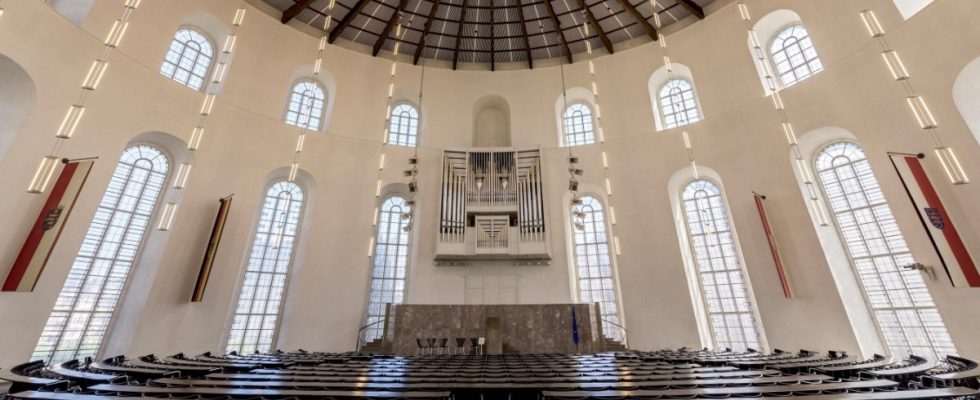The Paulskirche in Frankfurt is not to be reconstructed in its original form. Instead, the situation created in 1948 should become the basis for the renovation that has been necessary for a long time. This is what the expert commission, which has been discussing the future of the church for almost two years, recommends in its report published on Friday.
She thus joins a vote by the Frankfurt city government, which had also spoken out in 2019 against a historical reconstruction and in favor of modernizing the post-war conversions “which themselves have already become a monument”. The “double character” of the building should be preserved. Even then, a “House of Democracy” next to the church was decided, which the experts now also support. The new building and the Paulskirche are to become a “place with international appeal for reflection on democracy in the past, present and future”.
The question of the future role of the Paulskirche came up in 2017, when a thorough renovation of the building became necessary. It was originally scheduled to be completed in time for the 175th anniversary of the 1848 revolution and the 75th anniversary of the church’s post-war reopening, both of which are this year.
As Minister of State for Culture, Monika Grütters called for the history of democracy to be “made sensually tangible”
Then, however, more and more voices called for the building measures to be used as an opportunity to restore the church to its original condition. The Time-Journalist Benedikt Erenz described the meager reconstruction of the church, which burned out during the war, as a “second destruction” and lamented its “architecture of penitence and remorse”, which made the previous role of the church invisible.
Historical representation of the same hall in 1848, when the Paulskirche was the seat of the German National Assembly.
(Photo: IMAGO/Heritage Images)
In the years following the March Revolution, the evangelical church in the center of Frankfurt, consecrated in 1833, served as the seat of the first German parliament, the National Assembly. In 1944 it burned down after an air raid. In 1948 it was rebuilt, no longer as a church but as a symbol of German unity, democracy and as a venue. In 1949, Thomas Mann made his first public appearance in it after his return from the USA. In 1963, John F. Kennedy spoke there. In 1949 and 1950, the first two editions of the Frankfurt Book Fair took place in the Paulskirche before it moved to the exhibition grounds. What remains is the annual presentation of the Peace Prize of the German Book Trade.
Even when the city, which owns the building, spoke out against a historical reconstruction, its supporters did not give up. The Berlin political scientist Herfried Münkler described the fact that the original location of the parliament from 1848 was no longer recognizable due to the post-war reconstruction of the church as a “political memorial disaster”. The then Minister of State for Culture, Monika Grütters, also called for “reviving the aura of the authentic place” and “making the history of democracy a sensual experience”. The commission of experts she convened has nevertheless spoken out very clearly against the reconstruction.

